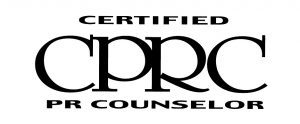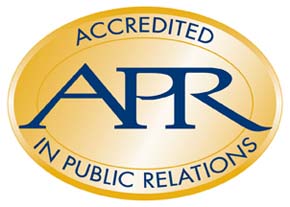Make this year YOUR year for accreditation!
If you have been pondering how to take your career to the next level, consider seeking the Accreditation in Public Relations (APR) certification or becoming a Certified Public Relations Counselor (CPRC). The APR accreditation program is designed for public relations professionals with at least five years of job experience and/or a bachelor’s degree in a communications field. The questions on the APR Examination are drawn from the enduring principles of public relations, including RPIE (Research, Planning, Implementation and Evaluation), ethics and law, crisis communication management and current issues in public relations.
Why APR? Read this testimonial on how APR can improve your work life and confidence.
The APR accreditation process can be summarized in four steps. It is important to review resources available for all four steps, starting with the process chart, before pursuing APR.
- Review and complete the Examination for Accreditation in Public Relations Application.
- Study and sit for a Panel Presentation.
- Online Study Course available to assist with studying for the APR examination.
- Demonstrate a commitment to lifelong learning through APR Renewal.
FPRA also offers a second-tier credential for senior-level counselors who have already earned APR accreditation. To learn more about becoming a Certified Public Relations Counselor (CPRC), click here.
Getting Started
Interested candidates are encouraged to review the APR information page, download the APR study guide, and complete the application. A $385 Examination fee must be paid at the time of registration, and FPRA offers members a $100 rebate to help offset the cost. Some chapters offer additional financial assistance.
Before sitting for the Examination, candidates must schedule a Panel Presentation to ensure that they have the knowledge and experience they need to advance to the computer-based Examination. Candidates are also encouraged to take advantage of FPRA’s local and statewide Examination review sessions. After the panel recommends that a candidate be advanced to the computer-based Examination, he (or she) is able to take his Examination at their convenience at any Prometric Testing Center. Candidates who receive a passing grade are encouraged to apply for a $100 rebate within 30 days of completing the exam.
Here are four quick reasons why seeking accreditation should be important to you:
- Gold Standard of the Profession: Visionary leaders in 1964 established the Accredited in Public Relations (APR) credential as a way to recognize practitioners who have mastered the knowledge, skills and abilities needed to develop and deliver strategic communications. Decades later, as public relations evolved, the APR remains the recognized gold standard for the profession.
- Recognized Standard: During the past 50 years, the procedures required to earn the APR have changed. However, one thing has not: The value behind Accreditation and the importance it plays in a society now driven by digital communications, rapidly emerging technologies and a 24-hour news cycle. Many communicators today work under the mantle of “public relations.” Accredited members go much further. They demonstrate commitment to the communications profession, to their clients, to their company or organization, and to themselves. Earning the APR is an individual achievement open only to seasoned working professionals with a recommended five or more years public relations experience. It’s a challenging process but it is worth it.
- High Performance: APRs are required to commit to learning through continuing education, serving as a volunteer or other prescribed professional development activities. Most importantly, APRs are required to measure up to high standards of performance, and to stay on the right side of ethical practice.

The credential of Certified Public Relations Counselor or CPRC is the second-tier credential offered by FPRA. The certification process was developed to recognize professional growth and achievement of senior members who have already earned the APR designation. Candidates for CPRC must be a member of FPRA and have a minimum of 10 years of professional practice in public relations. Learn more about the process and how to apply to sit for the exam.
The Certified Public Relations Counselor credential demonstrates an ability to counsel clients through all public relations scenarios, from crisis to internal to external communications. The CPRC credential is only provided to members with more than 10 years of experience. It is the highest level of credential obtainable through FPRA.
ABOUT THE CPRC
Requirements
Candidates for CPRC must be a member of the Florida Public Relations Association and have a minimum of 10 years of professional practice in public relations. They also must have earned their APR credential.
Process
Earning the CPRC credential involves passing a written and oral exam. The written portion is comprised of case studies. The oral portion involves providing a persuasive presentation to a panel of certified judges.
Preparation
The Ocala Chapter provides several study sessions and workshops throughout the year for the credential programs. Contact us for details. FPRA also hosts study sessions.
Benefits
Members who have earned their CPRC may join the Counselors’ Network. Benefits also include opportunities for professional development, special sessions during Annual Conference and access to the “who’s who” of the profession.
Cost
The CPRC application and examination fee is $ $350, which is due at the time of application.
So, if you are looking for a way to take your career to the next level, consider pursuing APR / CPRC certification to help you realize your career goals with unique marks of distinction.

